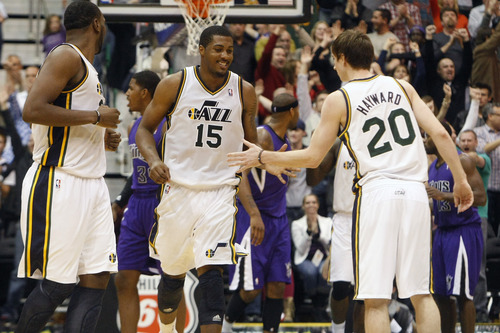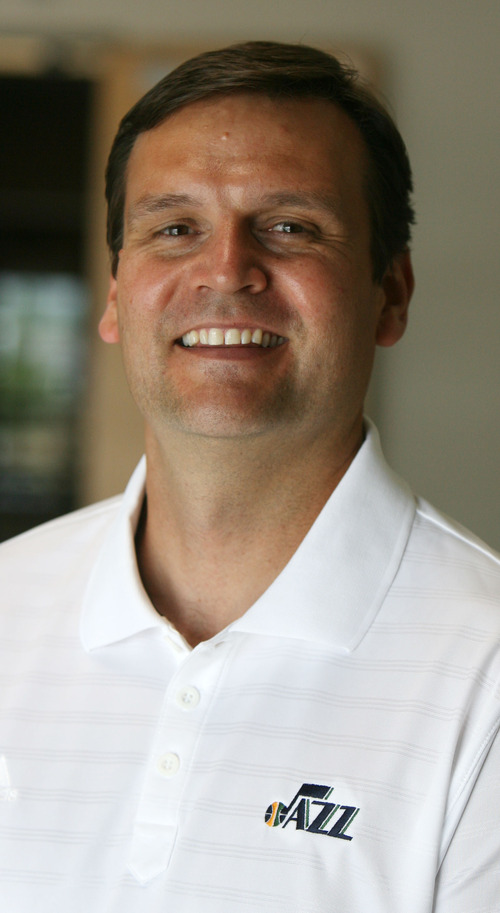This is an archived article that was published on sltrib.com in 2013, and information in the article may be outdated. It is provided only for personal research purposes and may not be reprinted.
After the most massive restructuring of their roster in franchise history, the Utah Jazz open training camp Sept. 30 perfectly positioned for long-term success.
They hope.
While the new-look Jazz won't contend for a championship this season, general manager Dennis Lindsey accomplished what he set out to do after Utah missed the playoffs last spring.
Lindsey cleansed the roster of high-priced, salary cap-eating free agents Al Jefferson, Paul Millsap, Mo Williams and Randy Foye, DeMarre Carroll, Earl Watson and Jamaal Tinsley.
By doing so, Lindsey created financial flexibility for his team as well as the opportunity for young players Gordon Hayward, Derrick Favors, Enes Kanter, Alec Burks and rookie Trey Burke to show whether they are capable of leading Utah into the next decade.
The on-court result of Lindsey's work?
Depending what coach Tyrone Corbin sees in training camp, of course, the average age of the Jazz's starting lineup could be 21.8 years. Not counting the newcomer Burke, the "core four" of Hayward, Favors, Kanter and Burks made exactly 35 starts last season. According to Lindsey, the house-cleaning was necessary for the Jazz to someday make the jump from middle-of-the-pack playoff team — where Utah has wallowed for the last five years — to legitimate championship contender.
"We were OK with being playoff-competitive as long as we had [salary cap] flexibility, too," Lindsey said. "But if we had invested in our veteran players, we were going to lose that flexibility, especially with some other [contract] extensions coming up."
Specifically, the Jazz are already talking about new deals with Hayward and Favors.
"We could no longer ride being a playoff-competitive team [loaded] with veterans," said Lindsey, who chuckled. "And, yes, I understand that being young does not necessarily translate to being instantly good as it relates to the NBA."
No matter how painful the coming season becomes, Utah is committed to the idea of developing young players, accumulating assets like future draft picks and riding out what could be a 25-win storm.
"We will not be going back on that philosophy," Lindsey promised.
Clearly, the Jazz are now Lindsey's baby, even if he doesn't want to be considered the father.
Executive vice president of basketball operations Kevin O'Connor is now more of an adviser than a decision-maker, and Lindsey recently hired his own assistant general manager, Justin Zanik.
Still, suggestions Lindsey has become the lone pilot of this experimental craft that will take Utah into the next stage in franchise history do not sit well with him.
"I've ever felt that way — when I was scouting, when I coached, when I played or now that I've moved up from assistant GM to the elite seat," Lindsey said. "Building a team, organizing a team, maturing a team, is a very collaborative process."
Exhibit A: The Jazz's decision to move up and draft Burke last summer.
"There is a good chance Trey Burke isn't here," Lindsey said, "unless we had Ty Corbin's input."
When Lindsey is asked if he's willing to concede he has at least "put his stamp" on the franchise, he balks again.
"I don't like the saying that," he explained. "No. 1, it sounds selfish. No. 2, you don't do it on a unilateral basis. It's ownership. It's coaches buying in. It's listening to scouts and medical people. … If one guy could do it, I'd shake his hand."
One thing is certain.
Despite the questions about life without proven veterans like Jefferson, Millsap, Williams and Foye — they averaged a combined 56 points per game last season — Lindsey looks forward to the future.
"We are not running away from the decisions we made," he said. "We are looking to embrace this and we will embrace it — all the challenges of being so young.
"I believe we have the talent and character to move forward — incrementally. We are very much looking forward to the start of the journey with this young core group." —
Potential Jazz rotation
A possible starting lineup/depth chart for the Utah Jazz:
Point guard • Trey Burke
Age • 20
NBA experience • First year
Backups • John Lucas III, Jerel McNeal
Shooting guard • Alec Burks
Age • 22
NBA experience • Third year
Backups • Gordon Hayward, Brandon Rush, Ian Clark
Small forward • Gordon Hayward
Age • 23
NBA experience • Fourth year
Backups • Marvin Williams, Richard Jefferson, Jeremy Evans
Power forward • Derrick Favors
Age • 22
NBA experience • Fourth year
Backups • Marvin Williams, Jeremy Evans, Andris Biedrins
Center • Enes Kanter
Age • 21
NBA experience • Third year
Backups • Andris Beidrins, Rudy Gobert —
Jazz preseason roster
As of Sept. 20:
Player Pos Age Hgt Wgt College Years
Andris Biedrins C-F 27 7-0 242 Latvia 9
Trey Burke G 20 6-1 185 Michigan R
Alec Burks G 22 6-6 205 Colorado 2
Ian Clark G 22 6-3 175 Belmont R
Jeremy Evans F 26 6-9 194 W. Kentucky 3
Derrick Favors F-C 22 6-10 263 Ga. Tech 3
Rudy Gobert C 21 7-1 235 France R
Gordon Hayward G-F 23 6-8 215 Butler 3
Rich. Jefferson F 33 6-7 230 Arizona 12
Enes Kanter C 21 6-11 248 Turkey 2
John Lucas III G 30 5-11 165 Okla. State 5
Jerel McNeal G 26 6-3 200 Marquette 2
Brandon Rush G-F 28 6-5 210 Kansas 5
Marvin William F 27 6-9 23 N. Carolina 8





